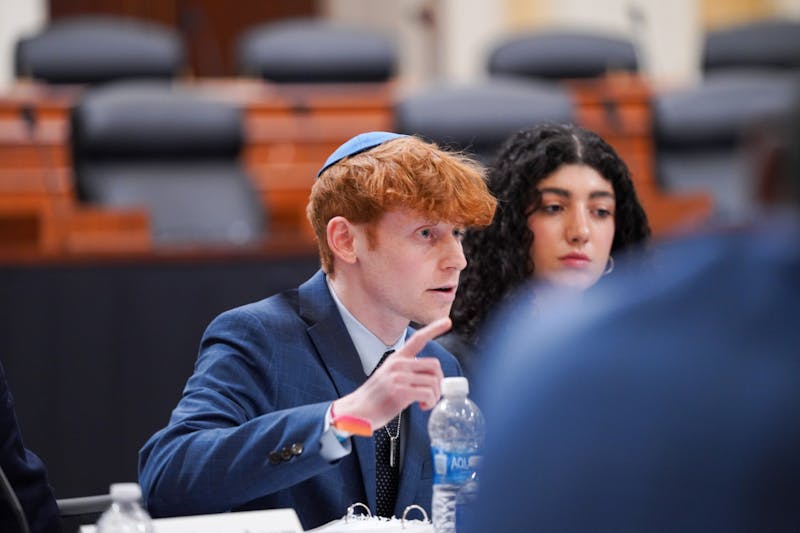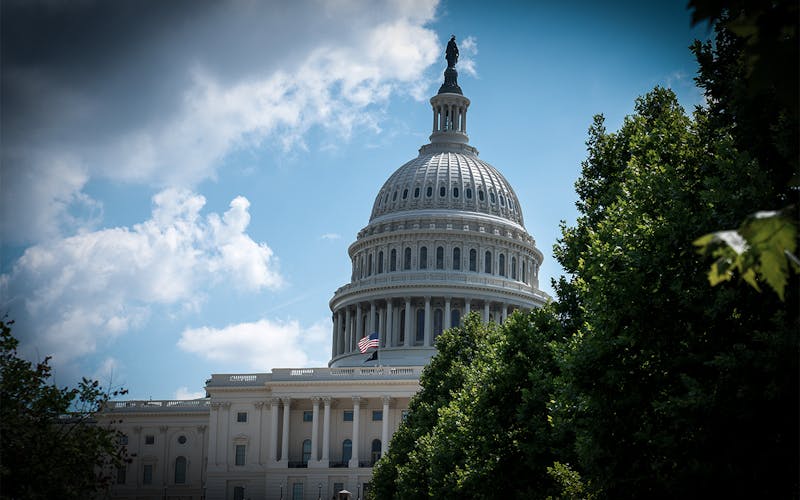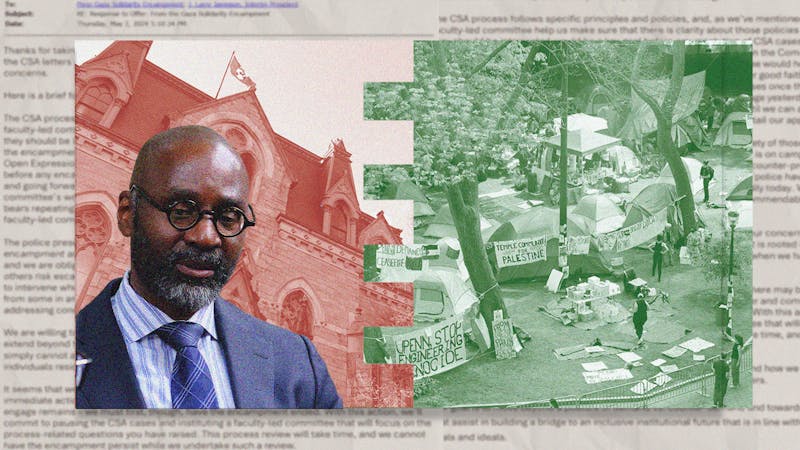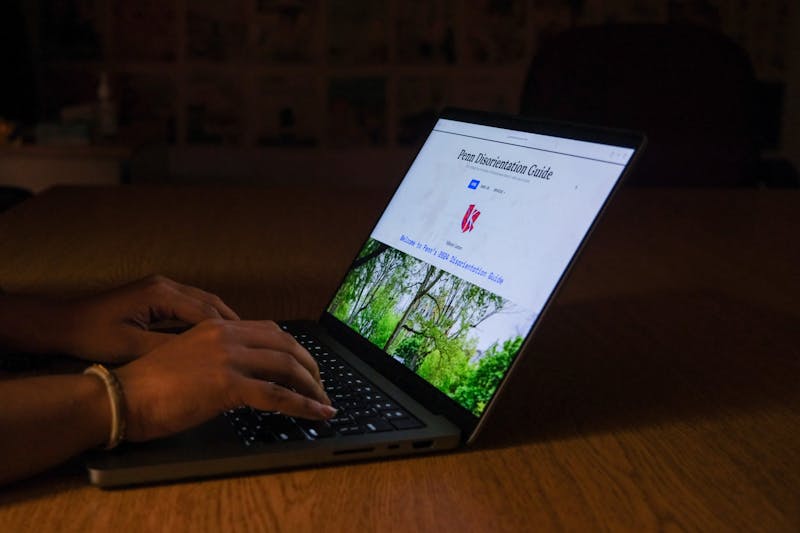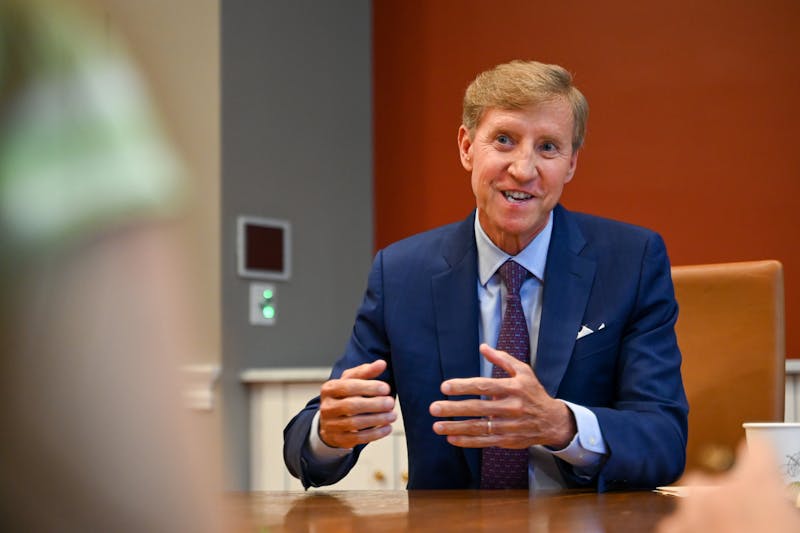
Climate activists briefly interrupted a fireside chat in Houston Hall with Chair of University Board of Trustees Ramanan Raghavendran and Philosophy professor Michael Weisberg.
The talk on Oct. 18, titled “How to Be a Climate Leader,” was part of Penn's Climate Week lineup of programming focused on sustainability and climate change. Shortly after the event began, a group of around eight demonstrators from the group Climate Defiance entered the venue for around five minutes, holding a banner that said “Divest from Death.”
Climate Defiance is a national youth activism group whose mission includes ending "fossil fuel extraction on federal lands and waters" and making climate change a prominent issue for politicians, according to its website.
The group addressed Raghavendran specifically, calling for him to use his position to lead the University’s divestment from fossil fuels.
“There is no reason for this institution to be invested in these systems of destruction which we have asked for divestment from for years. It is immoral and a violation of your duty to continue these investments. As chair of the Board of Trustees, you have the choice to divest,” one demonstrator said.
Penn security officers led the group of Climate Defiance activists out of the venue after being told by Weisberg to sit and wait for the opportunity to formally address Raghavendran during the question and answer portion of the event. As they were ushered out, they chanted “Off fossil fuels” and “Penn off genocide.”
2024 College graduate Sparrow Francis, a national student organizer for Climate Defiance, told The Daily Pennsylvanian that none of the protesters present on Friday were University students, though the action was “in solidarity with” the demands of various campus groups, such as the calls to the University to divest from fossil fuels and Ghost Robotics. Francis said that they sought the "permission" of student organizers from relevant causes, although it was not “an official endorsement.”
“Students aren't able to take actions themselves, very much, just because of the harsh and unjust profession that they've been met with by the administration,” Francis said.
Francis said that Weisberg’s suggestion to wait for the formal Q&A period was “absurd.”
“[We] won't stand for someone greenwashing, and pretending that they're good for the climate as [Raghavendran] has kind of painted himself,” they said. “There's no point [in] sitting down and listening to [that] liar talk about how to be a climate leader while he has hundreds of millions invested in fossil fuels.”
Francis said that the action aimed to disrupt the event without getting protesters arrested, though they “regretted” the protest's short duration. They also emphasized the importance of disruptive action to achieve climate justice goals.
“[Because] the University has refused to be guided by morals and acts of consciousness for so long, we can't really be fiddling around and taking the traditional routes,” they said.
After the demonstrators departed, Raghavendran and Weisberg continued their chat as planned. Much of the discussion drew on Raghavendran’s background as the managing partner and co-founder of Amasia, a global venture capital firm focused on making investments geared toward combating the climate crisis.
Raghavendran also reflected on Penn’s role in climate action, particularly referencing the recent appointment of Michael Mann as vice provost for climate science, policy, and action as an important step in furthering the University’s sustainability efforts.
During the talk, Raghavendran was asked a question about his thoughts on the idea of Penn’s divestment from fossil fuels. He responded by saying that Penn’s endowment is managed largely by third-party managers, giving him little control over how the University invests.
“Penn has very clear guidelines and a process for contemplating divestment from anything,” Raghavendran said. “And I can’t get in the way of that even if I wanted to.”
Simon Richter, Class of 1965 Endowed Term Professor of German and Climate Week organizer, said that the event was successful in providing students and faculty with the rare opportunity to speak with the chair of the Board of Trustees.
“I can count on this many fingers how often staff, students, and faculty get to talk to a trustee, much less the chair of the Board of Trustees,” Richter said. “And, you know, at this juncture in the University’s life, given what last year was like and so on, it’s hard to imagine which chair of a Board of Trustees would say ‘Yes, I’m willing to do that.’”
Director of the Environmental Innovations Initiative Katie Unger — who had a role in organizing the event — said that she felt that the event was successful despite the brief protest.
“I think it’s within the students’ rights to come and have their voices heard,” Unger said. “I think it’s just as [Raghavendran and Weisberg] mentioned, there is sometimes a tension between respect and open expression and we saw a little bit of that today. But I think overall, I was really happy with how the event went.”
The Daily Pennsylvanian is an independent, student-run newspaper. Please consider making a donation to support the coverage that shapes the University. Your generosity ensures a future of strong journalism at Penn.
Donate







